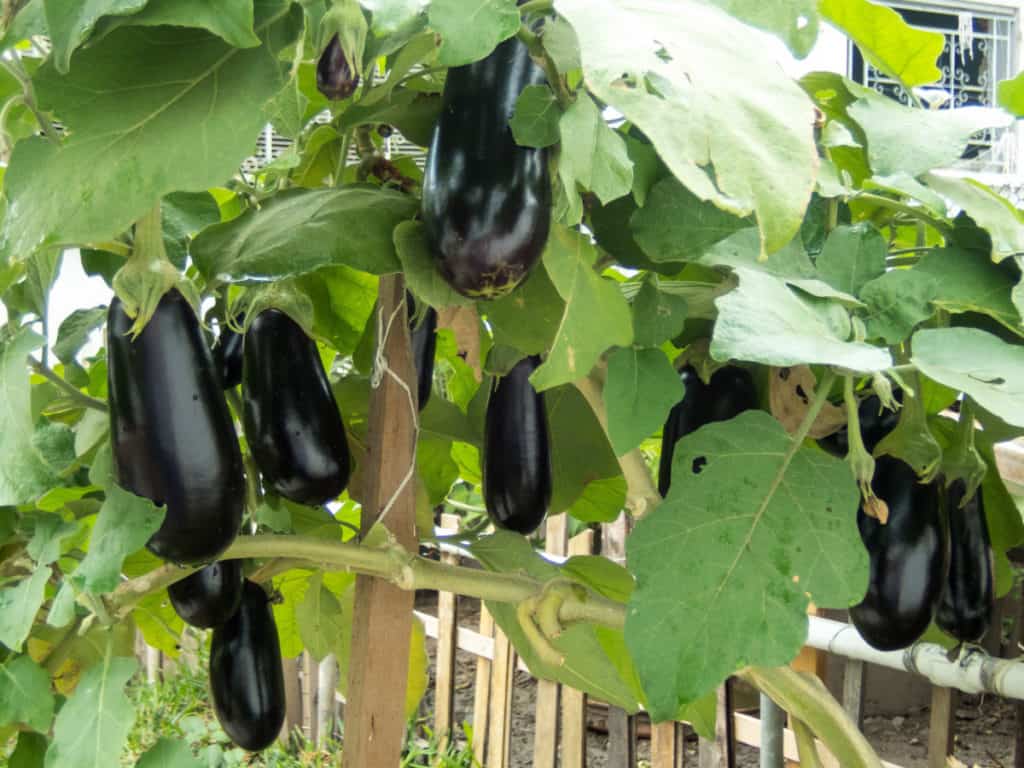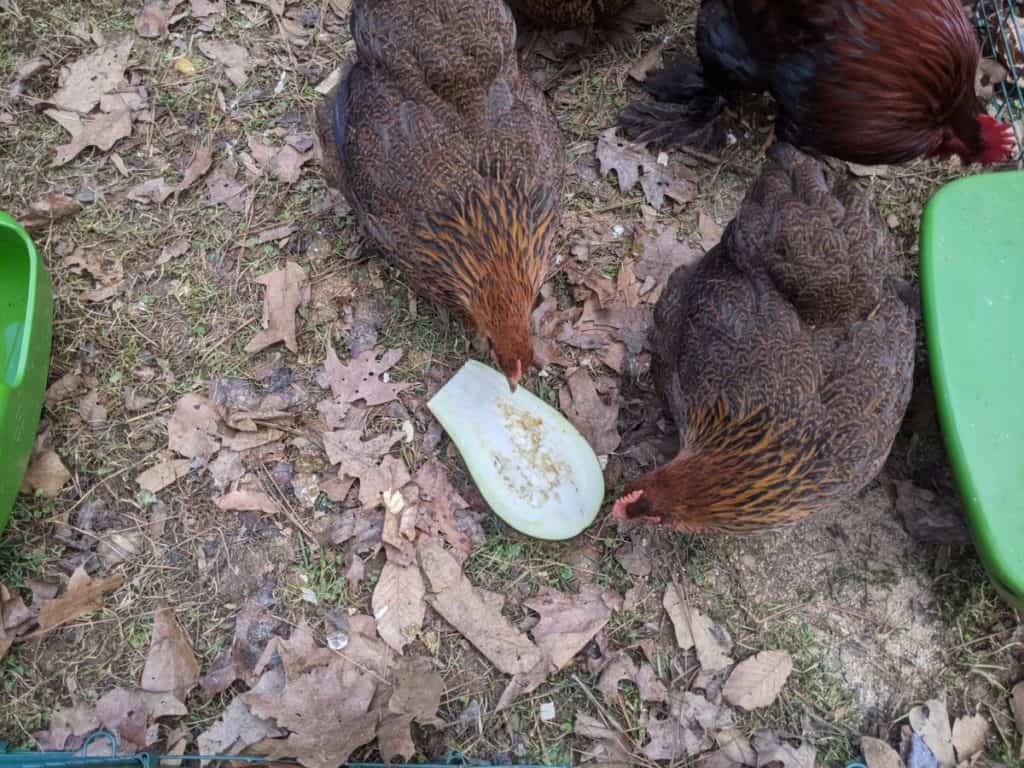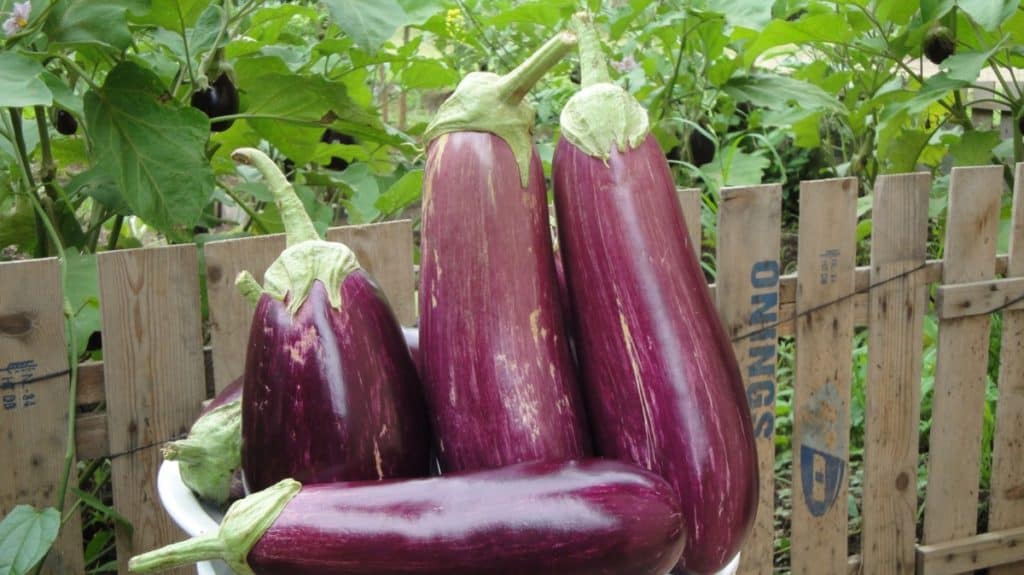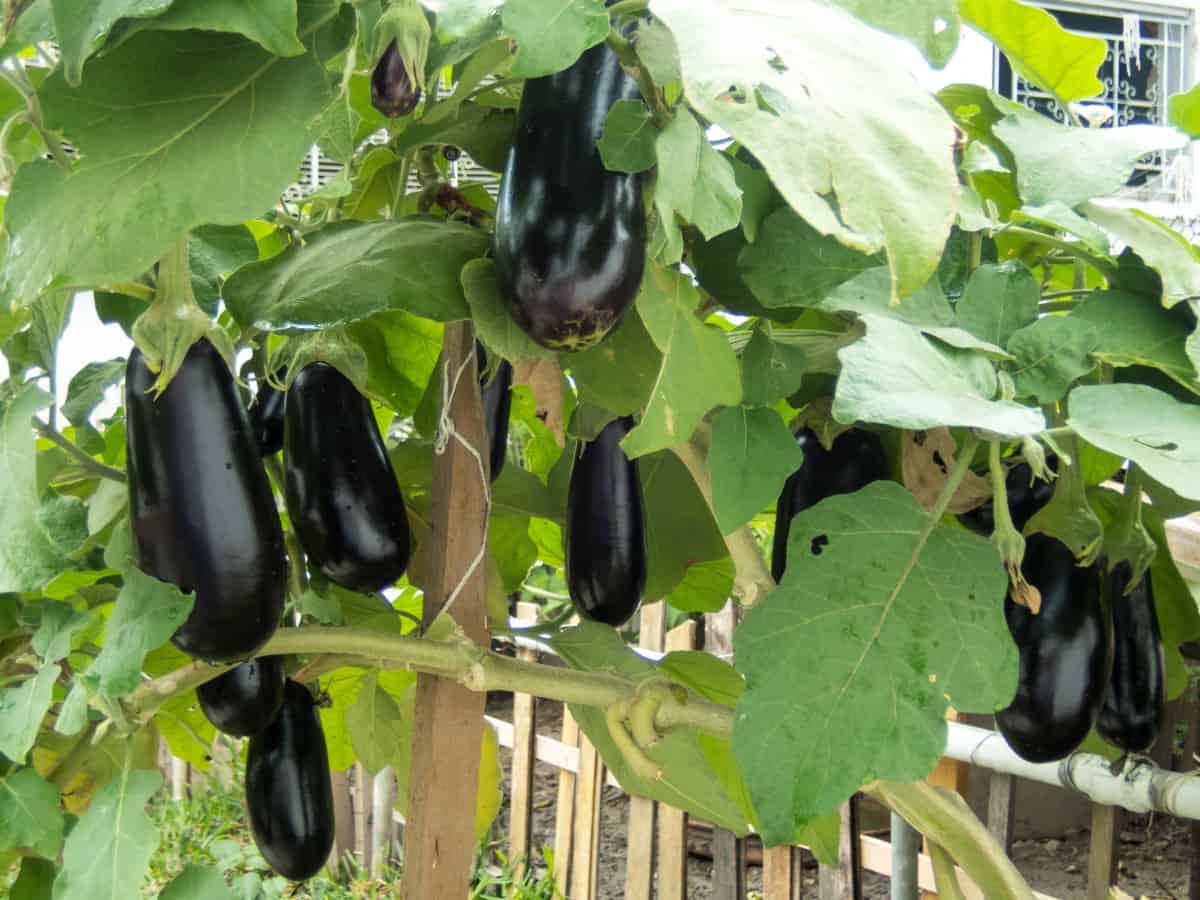
Think about feeding your chickens eggplants or aubergines? If your wondering do chickens like eggplant in the first place?
The answer is yes they do. Well, at least my chickens do. Your flock could of course be different depending on the breed and their preferences.
Often when my husband and I grow eggplant (aubergine) from seeds in our vegetable garden we have extras. These extra eggplants get fed to our flock in small amounts. There are some important things to beware of before feeding your chickens eggplant so take note.
Can Chickens Eat Eggplant? Yes, chickens can eat the flesh of eggplants but not the leaves or green parts. Eggplants are good for them. Eggplants are also known as aubergines. They are a part of the Solanaceae, a nightshade family of plants. This means the leaves contain Solanine which is poisonous to your chickens.
Eggplant should be given to your chickens as a treat and not as a large portion of their overall diet.
- Eggplant / Aubergine Nutrition Benefits For Chickens
- Is Eggplant Safe For Chickens?
- What is Solanine And Why Is It Bad for Chickens?
- How do you feed eggplant to chickens?
- Can Chickens Eat Cooked Eggplant?
- Can Chickens Eat Eggplant Seeds?
- Can Chickens Eat Eggplant Skin?
- Can Chickens Eat Eggplant Peels?
- Should I keep chickens away from the eggplants in my vegetable garden?
- Final Thoughts

Eggplant / Aubergine Nutrition Benefits For Chickens
Many people think of eggplants or aubergines as a vegetable, but they are technically a fruit. This is because they grow from a flowering plant and contain seeds.
Eggplants (aubergines) are a great source of vitamins and minerals. Eggplants contain amounts of vitamin K, vitamin B6, vitamin C, niacin, magnesium, thiamine, manganese, fiber, potassium, and folate.
Vitamin B6
Without the right amount of vitamin B6 your chickens can have problems such as anemia. For chickens to maintain a healthy appetite they also need this important nutrient.
Chickens can also develop skeletal disorders and start exhibiting nervous behaviors due to a lack of vitamin B6
Potassium
The NRC (1994) states that laying hens need 150 mg of potassium per day. When laying hens were given potassium chloride (KCl) supplements researchers found that it helped maintain egg production.
The study also found potassium helped reduce heat stress in hens during hot weather. Potassium also increases a hen’s water uptake.
Copper
Chicken farmers use copper to increase the growth of their broiler chickens for meat consumption. Copper has also been found to decrease overall cholesterol. Without this important mineral, chickens can also be susceptible to anemia.
Fiber
Studies show that chickens need at least 10% fiber content in their overall diet. Proper amounts of fiber improve feed intake, help in digestibility, and reduces feather pecking.
One cup of eggplant contains 2.5 g of fiber per serving.
Manganese
Chickens who have a deficiency in manganese can have problems such as perosis and chondrodystrophy. According to the Merck manual lacking the proper amount of manganese can also lead to poor hatchability or thin-shelled eggs in mature chickens.
Manganese is also important in a chicken’s overall diet for reproduction and development.
Folate
This nutrient is important to a chicken’s overall diet. Without folate, chickens may reduce feed intake, have poor feather growth, and problems such as anemia.
Vitamin K
Sufficient amounts of vitamin K helps maintain bone mineralization in chickens. A lack of vitamin K can affect blood coagulation. If your chicken gets a cut it could be fatal without the right amount of vitamin K in their diet.
Thiamine
A lack of thiamine will result in a decrease in appetite and could lead to nuromusclar disorders in chickens. These disorders cause weakness and impaired digestion.
Niacin
Skin and digestive organ disorders in chickens are caused in part by a lack of niacin in their overall diet.

Is Eggplant Safe For Chickens?
The flesh of the eggplant is safe for chickens to eat. Only the green parts are bad for your chickens because they contain the poison Solanine.
What is Solanine And Why Is It Bad for Chickens?
Solanine is found in the nightshade family of plants and is a glycoalkaloid poison. It is poisonous to all living things and is known to cause gastrointestinal and neurological disorders in humans among other problems.
Keep the leaves, stem, and green calyx away from your chickens because these are the poisonous parts.
How do you feed eggplant to chickens?
- All the green parts of the eggplant must be removed including the stem, leaves, and calyx. The calyx is the little green section at the top of the eggplant.
- Wash the eggplant and then cut the eggplant into two halves. You can set the halves on the grass with the inside of the eggplant facing up. This will allow your chickens to peck and eat as much as they want.
- You can also cut the eggplant into small cubed pieces and feed it to the chickens with other food. These small pieces are sometimes easier to peck apart.
- Another option is to cut it up into a total of 4 pieces and space them out if you have a larger flock.
- You can also string up the eggplant and let them peck at it in the chicken run for entertainment.
Below is a video of my chickens eating eggplant.
Can Chickens Eat Cooked Eggplant?
Chickens can eat cooked eggplant. Just make sure you haven’t put a lot of salt or spices on it before feeding it to them. Salty kitchen scraps have been reported to kill chickens in the past so don’t risk it.
Can Chickens Eat Eggplant Seeds?
Yes, chickens can eat the small seeds found in eggplants. The seeds are not poisonous and are safe to eat.
Can Chickens Eat Eggplant Skin?
Chickens can eat the eggplant’s skin. Only the leaves, calyx, and green parts of the eggplant are poisonous to chickens. This is because the eggplant is apart of Solanaceae, a nightshade family of plants.
Can Chickens Eat Eggplant Peels?
Yes chickens can eat eggplant peels. They are nutrious and healthy for your flock. Just avoid the leaves, calyx and green parts of the plant which are poisonous for chickens.
Should I keep chickens away from the eggplants in my vegetable garden?
If you free-range your chickens then Yes. They probably would not like the leaves but you should grow the plant in an area that is hard for them to reach or fence it off if you are really worried.
Tomatoes are also in the nightshade family of plants but our chickens have no interest in their leaves or our eggplants.
Final Thoughts
Eggplant has several minerals and vitamins that are beneficial to your chickens. However, the eggplant should only be given as a treat.
A good layer feed is very important to your chicken’s overall diet and eggplants can’t replace that. Give your chickens some sliced eggplant and see if they like it.

